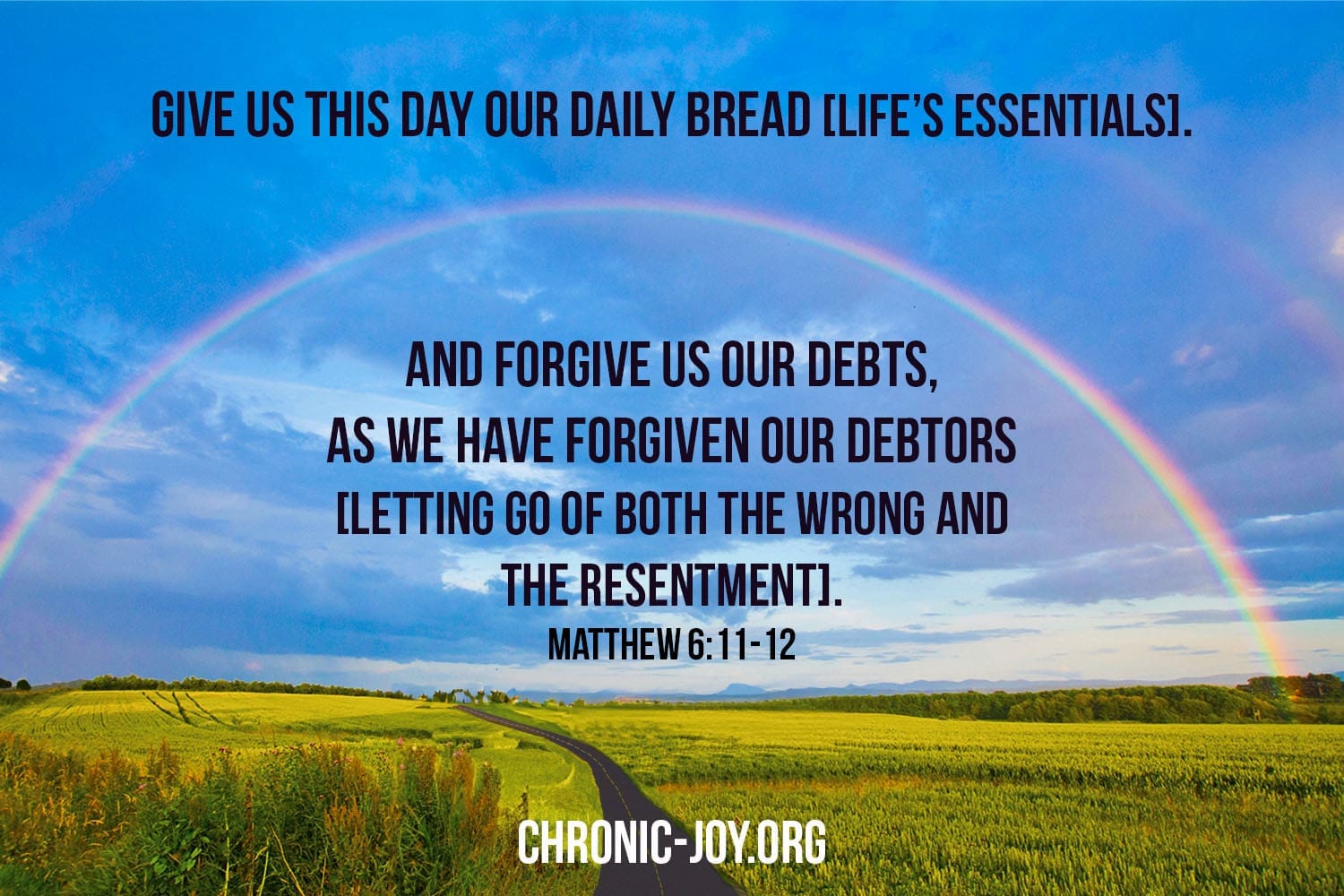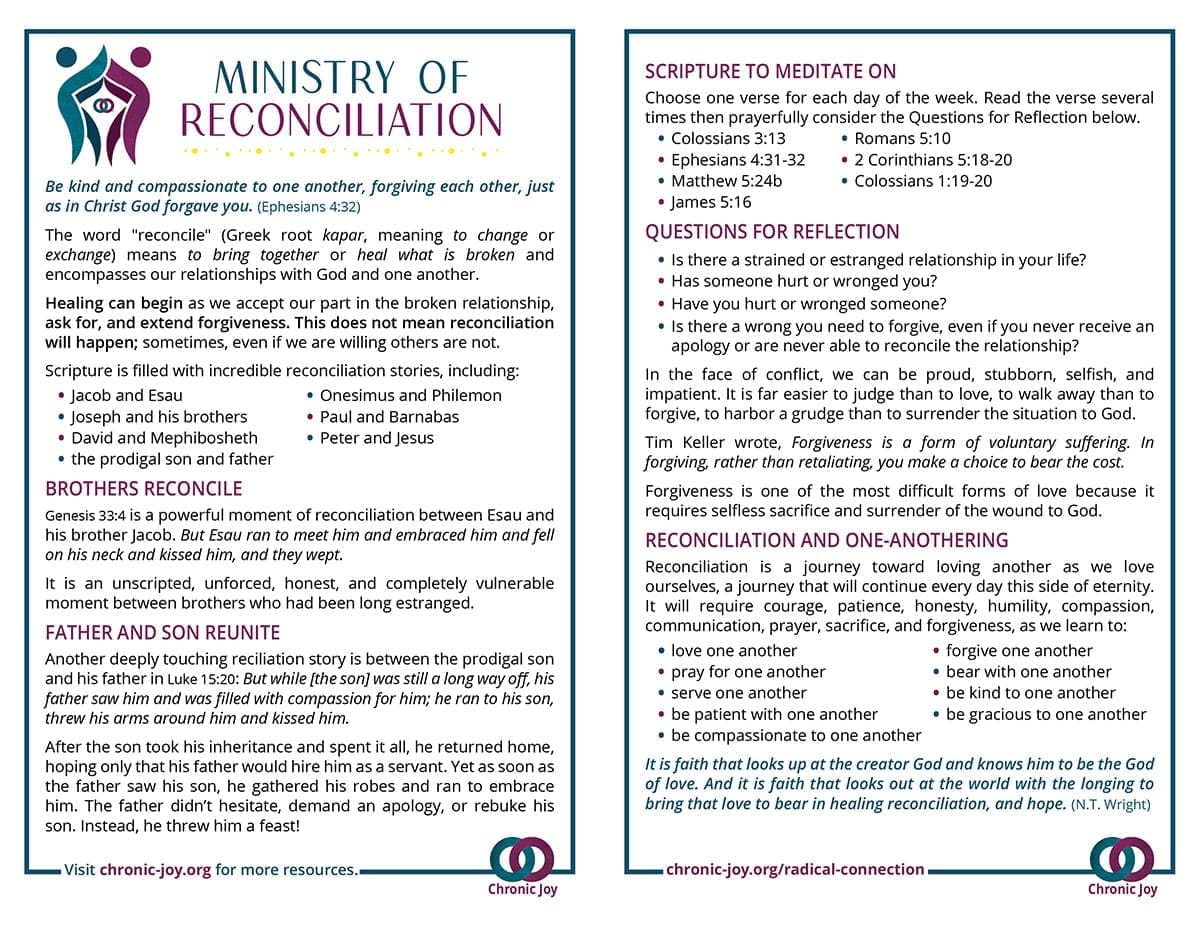
Give us this day our daily bread [life essentials]. And forgive us our debts, as we have forgiven our debtors [letting go of both the wrong and the resentment]. (Matthew 6:11-12 )
THE GIFT OF RAINBOWS
My mother and I experienced an incredible event about 20 years ago when I drove her home to Ontario after an extended stay with me in Michigan. As we traveled along I-69, we went through three spectacular rainbows bridging the highway, each vividly colored and perfectly arched. It marked the end of what had been an idyllic visit. Both our husbands were away (mine in Southeast Asia and my father in Scotland), and we thoroughly enjoyed having time together. Those unprecedented weeks with each other were a precious gift, and passing through the rainbow arches together felt like God was smiling down on us.
DEEDS AS EXPRESSIONS OF FORGIVENESS
The truth is our relationship was not always easy. Like Mom, I was the eldest daughter in a family with heavy responsibilities placed on us beginning when we were little girls. As in many families, ours has been bedeviled by serious crises and more than a few traumatic experiences that have affected parents and children across generations. Although our love for one another has always been there, sometimes anxiety, pain, guilt, and anger (or simply little time or energy to spare) created barriers for us. Yet our relationship did survive because we persisted in offering olive branches to each other through our deeds, even when our actual words of forgiveness were slow to come.
THE CHRISTIAN SIGNIFICANCE OF RAINBOWS AND FORGIVENESS
In the Judeo-Christian tradition, rainbows signify the promise of God’s grace and mercy for his people and symbolize hope and joy. For Christians, this promise is fulfilled by the birth, death, and resurrection of Jesus Christ, who acts as our path to salvation and mediator when we face the day of judgment. The prayer that Jesus taught His disciples provides a simple (but by no means easy) requirement for his disciples: to ask God to forgive our sins and to forgive others as we have been forgiven every day (Matthew 6:12).
In Jesus’ Plan for Daily Living (a practical study of the Lord’s Prayer), Rick Mangrum explains: “Forgiving another is not something you can do quietly to yourself as in a prayer. It is an act that requires communication to that person in an action.”
Notable Bible scholars have translated forgive us our debts to include sin, transgressions, and both literal and symbolic debts. Mangrum writes that the phrase also refers to “anything that should be left, sent, or pushed away.” He notes forgiveness directly follows Matthew 6:11, where we ask for our daily bread because “just as we must eat daily, we must confess and forgive daily.”
LEARNING TO LIVE BY THE LORD’S PRAYER
As I learned in my relationship with my mother, “once and done” forgiveness may not be possible, and repeated “debts” will occur. The Lord’s Prayer reminds me to forgive, ask for forgiveness for this day, and replace distance and hurt with empathy and kindness. Growth in my relationship with God means accepting that He forgives me even though I transgress repeatedly.
My mother and I shared a deep history of problems from the past along with the daily challenges facing any modern family. There was great comfort in realizing The Lord’s Prayer teaches that it is enough to repair, strengthen, and maintain interpersonal relationships one day at a time. While I may not be able to forgive the memory of long-ago events all at once, I can decide to release them for the day, just as I can choose to replace present feelings of hurt with acts of kindness.
THE TREASURE OF FORGIVING AND RECEIVING FORGIVENESS
While usually patient women, Mom and I shared quick tempers and (sometimes) sharp tongues under stress. We also shared a strong faith and the capacity for love, empathy, and generosity of spirit. Through God’s grace, we could set aside judgments and let our daily prayers and acts of loving kindness prevail despite whatever storms we faced or even caused in the past and present.
I treasure the conversations we had near the end of Mom’s life when we finally put into words our reassurance of forgiveness for one another. Now that she is gone, they have become a treasured memory from God that is even more glorious than the blessing of passing through those rainbow arches together.
PRAYER
Heavenly Father, thank You for the assurance of forgiveness that You have provided us through the sacrifice of our Lord Jesus Christ. May we be mindful that our faith calls us to grant forgiveness to others, just as we need to receive it from them. In our gratitude to You, may we be humble enough to remember our shortcomings before we rush to judgment of others. Protect us from the sin of pride that can keep us from nurturing healthy and loving relationships with one another. Help us, dear Lord, to forgive ourselves as You have so lovingly pardoned us. May we have the grace to forgive and receive forgiveness daily by following in the footsteps of Jesus, using the prayer He taught us as our guide. In the name of Christ, amen.
QUESTIONS FOR REFLECTION
- What does Dr. Rick Mangrum’s statement that forgiveness must be “communication…in action” mean to you? Can deeds be sufficient, or are words of forgiveness always necessary?
- Are there relationships in your life that require you to “confess and forgive daily” to sustain them? (Praying for strength, wisdom, and love for yourself and others may be necessary.)
- What have you learned about forgiveness from the Ministry of Reconciliation printable that helps you understand why it is so necessary in practicing our faith?
- Mangrum says forgiveness requires daily actions, but sometimes, it takes time for the heart to heal. What activities from the Kindness Multiplied printable could you try to help you build the qualities of empathy, grace, and mercy while healing in your relationship takes place?
INVITATION
Christian interpersonal forgiveness involves the virtues of empathy, grace, and mercy to repair and sustain relationships. Reconciliation is the process of restoring broken relationships, of building something new from forgiveness. We invite you to visit two Chronic Joy resources to help you deepen your understanding and practice of reconciliation in your life.
- The Ministry of Reconciliation printable is a tool for stepping in and pressing on.
- The Kindness Multiplied printable provides some ideas for practical ways to rebuild relationships and express kindness to others.


Margaret A. Hoggard
Maggie believes that creativity has the power to transform us when the Holy Spirit inspires it. A lifelong learner who desires to serve God in all she does, she holds master's degrees in teaching language arts and Christian interdisciplinary studies. After retiring as a college English instructor, she earned certifications in spiritual formation, women’s ministry, and Christian education. Maggie has one son and three grandchildren and lives in Michigan with her husband, Royce. Her interests include crafting, drama, reading, art, music, and walking.

Ministry of Reconciliation
The word "reconcile" (Greek root kapar, meaning to change or exchange) means to bring together or heal what is broken and encompasses our relationships with God and one another.

Recent Comments